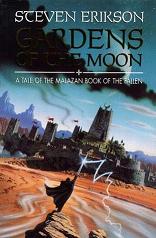
Gardens of the Moon
Steven Erikson
703 pages
published in 1999
This may very well be the ultimate epic fantasy series. Ten books are projected, of which seven so far have been published --this being the first one-- and as far as I know each sequel is bigger then the previous book. Size of course isn't everything and there have been enough other fantasy brick series published, so what makes this one so special?
It has everything.
A horrendously complicated system of magic, the Undead (they're good guys, sort of) dragons, a multitude of lesser and greater gods, epic battles, a plot that makes the Wheel of Time look simple, a grittiness that matches anything Glen Cook wrote about in the Black Company series, great and powerful heroes and villains (but who is who depends on your point of view), several innocents caught up in it all, worldweary and cynical soldiers still trying to do what's right, wizards and demons by the ton, even honest to god ninjas. Gardens of the Moon is the first book of a new fantasy series, but it feels as if you're dropped in the middle of a long running one. There's no slow start, no gradual acclimatising; what little clues are given to the greater story you have to find for yourself. Little is explained, there are no handy infodumps and if you're not familiar with epic fantasy in general, do not even start this.
You would expect the result of all this to be pretty naff; at least that is what I thought when I first heard about this series. At the 2000 Eastercon one of the goodies in the goodie bag was an audio extract from Gardens of the Moon, read by the author himself: it sounded ridiculous. It was only after I'd seen multiple people raving about this series that I took another look at it. I'm glad I did, since it turned out this series had everything I look for in an epic fantasy series and it's even written well, something that you cannot always depend on in the genre.
As said, Gardens of the Moon drops you straight into the story, in a world that's fully realised but not explained, with a rich history only slowly revealed and mostly in passing. No concessions are done to the reader, which makes it hard to get engaged if you're the type of person who likes to know what's going on; fortunately I'm usually content to let the author dazzle me in the hopes that it will all make sense in the end. Which didn't quite happen here, but did enough not to feel cheated.
The story revolves around the Bridgeburners, an elite marine sapper unit of the dreaded Malazan Empire, a young empire that has been busily conquering a large part of the world, including all but two of the free cities of Genabacksis. They're part of the army besieging Pale, when in the end phase of the siege a backlash of magic from the Malazan's army own mage cadre most of the Bridgeburners are killed. The remainder, under leadership of the demoted marshall, now sargeant Whiskeyjack, is sent on to the last remaining city to hold out against the Malazans, Darujhistan, to infiltrate the city and make it ripe for conquest. This part of the story could've been written by Glen Cook, as it features the same sort of motley crew of soldiers as he portrayed in his Black Company series.
In a second storyline, we follow the adventures of a odd band of friends, all regulars of the Phoenix Inn in Darujhistan, who each in their own way are drawn into a plot against the city's assassins guild, who are being killed left, right and center by an unknown power. But since the Malazans are found of using such guilds against the rulers of the cities they want to conquer, it's not clear whether the destruction of the guild is a bad thing. The Brigdeburners however are already in the city mining the streets.
Meanwhile there's young noble born captain Paran, newly commissioned to take command of the Bridgeburners, only he's killed before he can take up his command. Not to worry, he gets better through divine intervention and also gets caught up in the plotting around Darujhistan, where the coming Malazan attack might take an entirely different from and have an entirely different goal than anyone suspects. Paran is an engaging character, not yet as cynical as the Bridgeburners though learning quickly. There are several more plot strands, all of which come together for the grand finale, which will determine the fate of Darujhistan and the Bridgeburners alike and which sets in motion quite a few things that'll only pay off in future installments in the series.
It took me some time to get into this, and there were some rough edges to the story, but in the end Gardens of the Moon was a captivating read, as enjoyable but better than most other epic fantasy series I've enjoyed. Not to be recommended as your first taste of the genre, or if you're overtly allergic to settings that have everything, including the kitchen sink thrown into them.
Read more about:
Steven Erikson,
Gardens of the Moon,
Malazan Book of the Fallen,
fantasy,
book review